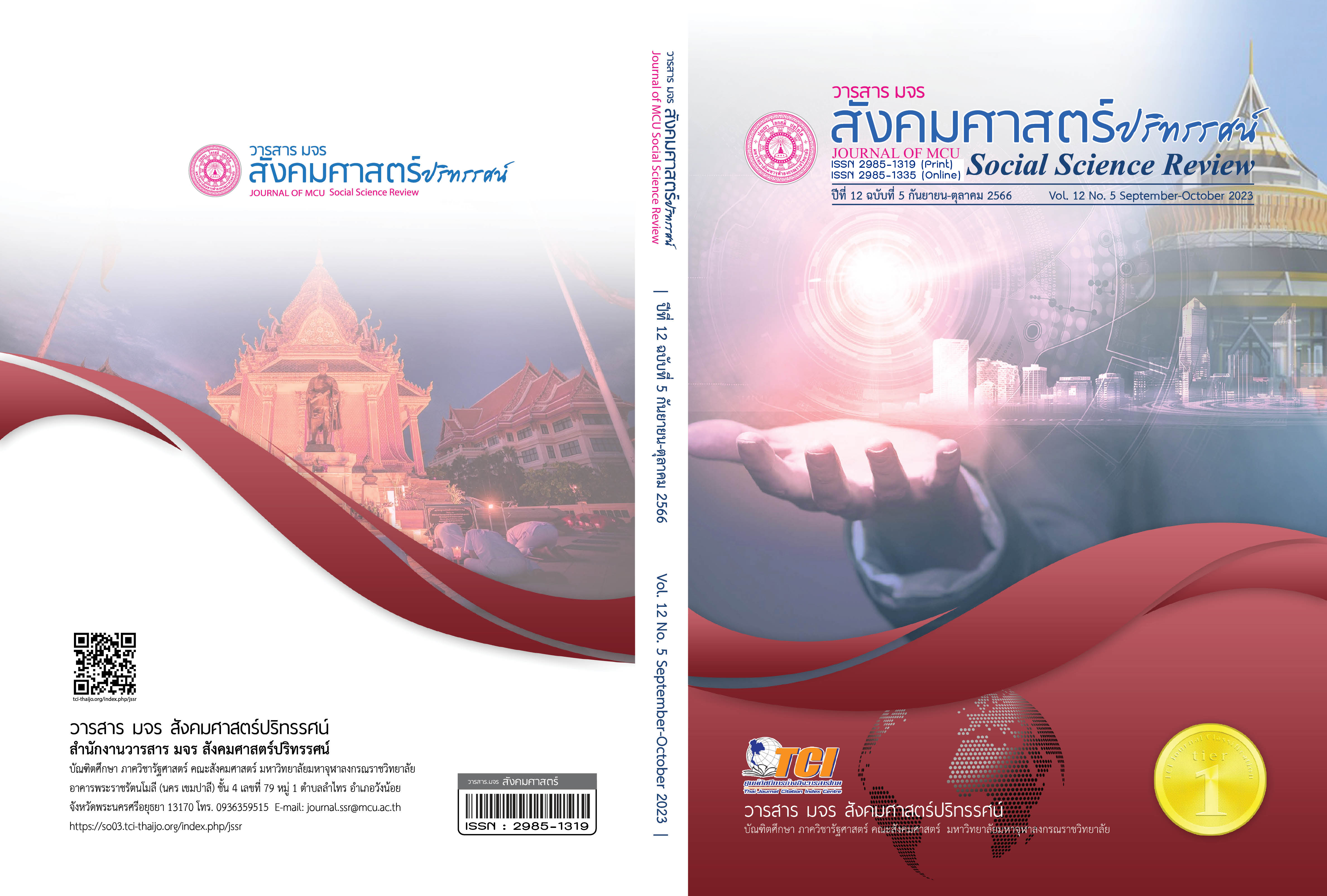ปัจจัยที่ส่งผลต่อเงื่อนไขที่เอื้ออำนวยหรือเป็นอุปสรรคต่อการแจ้งเบาะแสในระบบราชการไทย: กรณีศึกษาโรงพยาบาลชุมชนหนองน้อย และองค์การบริหารส่วนจังหวัดหนองใหญ่
คำสำคัญ:
การแจ้งเบาะแส, เอื้ออำนวย, อุปสรรค, ระบบราชการไทยบทคัดย่อ
บทความวิจัยนี้มีวัตถุประสงค์เพื่อ 1. ศึกษาเงื่อนไขที่เอื้ออำนวยหรือเป็นอุปสรรคต่อการแจ้งเบาะแสในระบบราชการไทย และ 2. นำเสนอแนวคิดต่อการพัฒนาระบบการแจ้งเบาะแส โดยใช้ระเบียบวิธีการศึกษาเฉพาะกรณี การสัมภาษณ์แบบเจาะลึก การสังเกตแบบไม่มีส่วนร่วม การศึกษาเอกสาร วิเคราะห์ข้อมูลและสรุปผลการศึกษาเพื่ออธิบายและทำเข้าใจปรากฏการณ์การแจ้งเบาะแส
ผลการวิจัยพบว่า ในระบบราชการไทย การแจ้งเบาะแสเกิดขึ้นจากเงื่อนไขปัจเจกบุคคล คือ ปทัสถานของวิชาชีพ การนับถือตนเอง ความเชื่อในการควบคุม พัฒนาการทางจริยธรรม ความเชื่อทางจริยธรรม และการมีส่วนร่วมของภาคประชาสังคมและสื่อมวลชน อย่างไรก็ตาม เงื่อนไขด้านยุทธศาสตร์และนโยบายภาครัฐและเงื่อนไขด้านองค์กร ไม่ได้เอื้อให้เกิดการแจ้งเบาะแส การศึกษาเสนอว่า รัฐไทยควรมีการปรับปรุงยุทธศาสตร์ ระบบนิติบัญญัติ การบริหารจัดการกรณีการแจ้งเบาะแส การคุ้มครอง การป้องกันการแก้แค้น กำจัดระบบอุปถัมภ์ และปฏิรูประบบการทำงานของภาครัฐ ความเป็นมืออาชีพ ความโปร่งใส และการมีส่วนร่วมของภาคประชาสังคมและสื่อมวลชน
เอกสารอ้างอิง
คณะกรรมการป้องกันและปราบปรามการทุจริตแห่งชาติ. (2560). ยุทธศาสตร์ชาติว่าด้วยการป้องกันและปราบปรามการทุจริต ระยะที่ 3 (พ.ศ. 2560 - 2564). สืบค้น 24 สิงหาคม 2562, จาก http://www.anticor.moi.go.th/data/strategic-plan60/full.pdf
นนท์ น้าประทานสุข. (2561). บทบาท หน้าที่และกลไกขององค์การภาครัฐและภาคประชาสังคมต่อการต่อต้านและปราบปรามการทุจริตคอร์รัปชั่น. กรุงเทพฯ: สำนักงานผู้ตรวจการแผ่นดิน.
พิศอําไพ สมความคิด และรัชนี แมนเมธี. (2557). มาตรการคุ้มครองผู้แจ้งเบาะแสคอร์รัปชั่น. กรุงเทพฯ: สถาบันพระปกเกล้า.
สฤณี อาชวานันทกุล. (2555). คู่มือประเมินผลด้านสิทธิมนุษยชนอย่างรอบด้านของธุรกิจการโรงแรม. กรุงเทพฯ: สำนักงานคณะกรรมการสิทธิมนุษยชน.
อนันตนัฏ แบ่งบุญ. (2557). มาตรการทางกฎหมายในการคุ้มครองเจ้าหน้าที่ของรัฐที่เป็นผู้กล่าวหาหรือให้ถ้อยคำหรือแจ้งเบาะแสหรือข้อมูลความผิดต่อตำแหน่งหน้าที่หรือทุจริตต่อหน้าที่ตามกฎหมายไทยเปรียบเทียบกับประเทศมาเลเซียและนิวซีแลนด์ (วิทยานิพนธ์นิติศาสตรมหาบัณฑิต สาขานิติศาสตร์). กรุงเทพฯ: มหาวิทยาลัยธุรกิจบัณฑิต.
Dozier, J. & Miceli, M. (1985). Potential Predictors of Whistleblowing: A Prosocial Behavior Perspective. The Academy of Management Review, 10(4), 823-836.
Hirschman, A. O. (1970). Exit, Voice and Loyalty: Response to decline in Firms, Organizations and States. Cambridge, MA: Harvard University Press.
Keenan, J. P. (1992). Whistleblowing and the first-level manager: determinants of feeling obliged to blow the whistle. Journal of Social Behavior and Personality, 10(3), 571–584.
Miceli, M. P. & J. P. Near. (1984). The Relationships among Beliefs, Organizational Position, and WhistleBlowing Status: A Discriminant Analysis. Academy of Management Journal, 27(4), 687–705.
______. (1985). Characteristics of organisational climate and perceived wrongdoing associated with whistleblowing decisions. Personnel Psychology, 38, 525-544.
______. (1992). Blowing the whistle: The organizational and legal implications for companies and employees. Lanham: Lexington Books.
OECD. (2014). OECD Foreign Bribery Report: An Analysis of the Crime of Bribery of Foreign Public Officials, OECD Publishing. Retrieved May 21, 2020, from https://doi.org/10.1787/9789264226616-en
Park, H., et al. (2008). Cultural Orientation and Attitudes Toward Different Forms of Whistleblowing: A Comparison of South Korea, Turkey, and the U.K. Journal of Business Ethics, 82, 929-939.
Transparency International. (2017). Corruption Perceptions Index 2017. Retrieved August 26, 2018, from https://www.transparency.org/news/feature
UNODC. (2018). Manual on Corruption Surveys. Retrieved April 21, 2020, from https://www.unodc.org/documents/data-and-analysis/Crime-statistics
ดาวน์โหลด
เผยแพร่แล้ว
รูปแบบการอ้างอิง
ฉบับ
ประเภทบทความ
สัญญาอนุญาต
ลิขสิทธิ์ (c) 2023 วารสาร มจร สังคมศาสตร์ปริทรรศน์

อนุญาตภายใต้เงื่อนไข Creative Commons Attribution-NonCommercial-NoDerivatives 4.0 International License.
เพื่อให้เป็นไปตามกฎหมายลิขสิทธิ์ ผู้นิพนธ์ทุกท่านต้องลงลายมือชื่อในแบบฟอร์มใบมอบลิขสิทธิ์บทความให้แก่วารสารฯ พร้อมกับบทความต้นฉบับที่ได้แก้ไขครั้งสุดท้าย นอกจากนี้ ผู้นิพนธ์ทุกท่านต้องยืนยันว่าบทความต้นฉบับที่ส่งมาตีพิมพ์นั้น ได้ส่งมาตีพิมพ์เฉพาะในวารสาร มจร สังคมศาสตร์ปริทรรศน์ เพียงแห่งเดียวเท่านั้น หากมีการใช้ภาพหรือตารางหรือเนื้อหาอื่นๆ ของผู้นิพนธ์อื่นที่ปรากฏในสิ่งตีพิมพ์อื่นมาแล้ว ผู้นิพนธ์ต้องขออนุญาตเจ้าของลิขสิทธิ์ก่อน พร้อมทั้งแสดงหนังสือที่ได้รับการยินยอมต่อบรรณาธิการ ก่อนที่บทความจะได้รับการตีพิมพ์ หากไม่เป็นไปตามข้อกำหนดเบื้องต้น ทางวารสารจะถอดบทความของท่านออกโดยไม่มีข้อยกเว้นใดๆ ทั้งสิ้น





